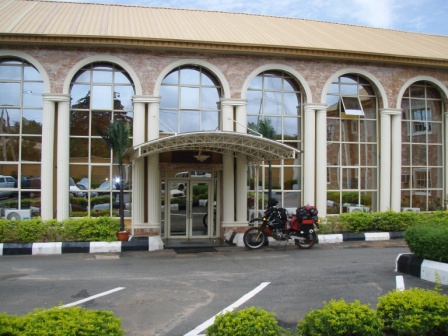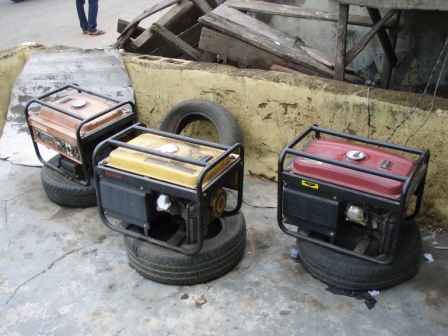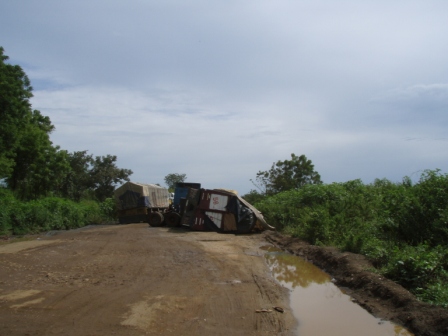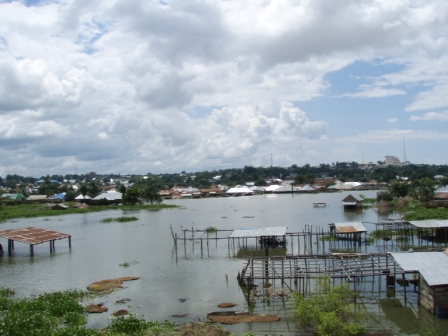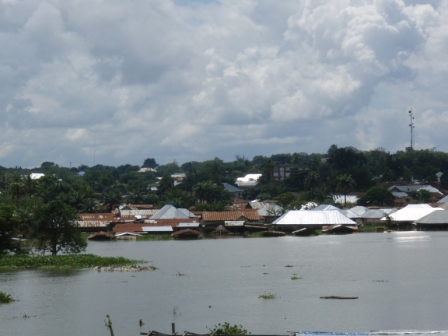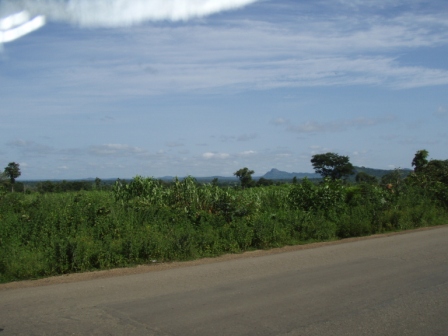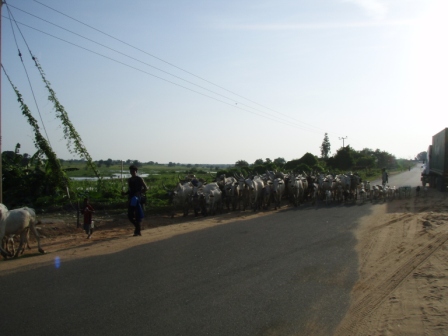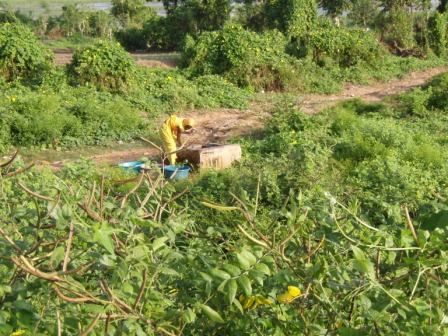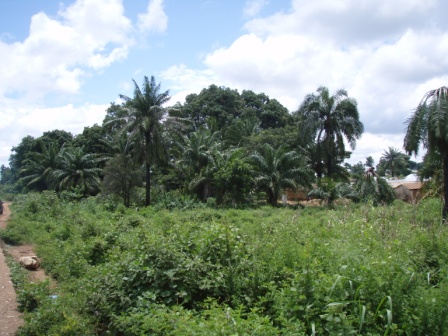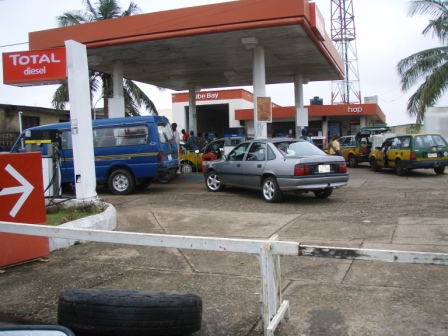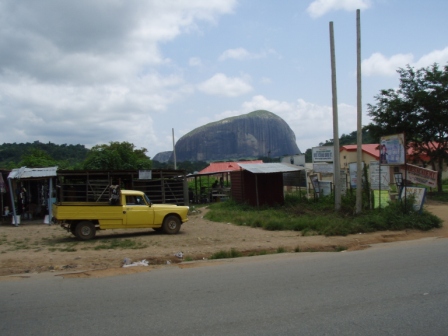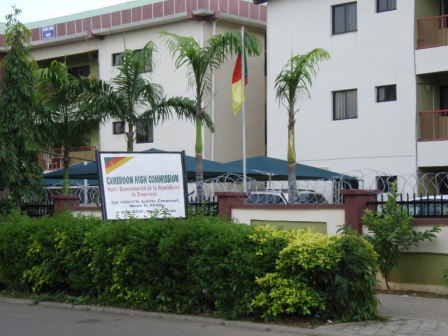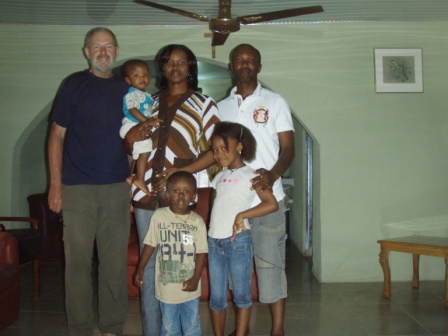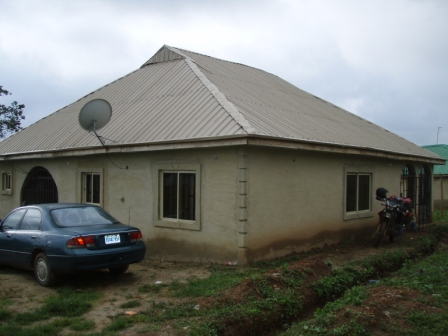Nigeria
I opted to cross at Ketou because all advice was to avoid the main crossing on the coast highway and I really wanted to find a way to avoid the roads leading through Lagos. Lagos is the largest city in Africa with over 8 million people. With a population of 180M 1/3 of all Africans on the continent live in Nigeria. So this is going to be a very different country from any I have traveled so far.
Well I got my wish. It was very quiet at Ketou as I had to wake up the customs officer from his mid-day nap. We then had to travel about a kilometer to a customs building that was no where near a road of any sort. Doors were unlocked and shutters opened and the proceedings began. No problems but it was painfully slow in the mid-day heat.
What really took time was the gauntlet of national police, gendarmes, immigration, military and health officials each with their own roadblock complete with tire shredders (all within sight of each other). All the same basic information was collected by hand in larger ledger books. How this information is utilized is anyones guess. It was a long hot process. Of course, no photos allowed.
Once freed from the clutches of bureaucracy I raced to the first place with hotels, Abeokuta. The most noticeable sight entering Nigeria is the large number of evangelical churches all recruiting members with huge roadside billboards. And not surprisingly there were lots of people everywhere.
Once again I found myself looking for a hotel in the dark. Abeokuta is a fair sized city and the darkness (at 6:00PM) seemed to coincide with the rush hour commute here. I had no hotel information on my GPS. After an hour of getting nowhere I asked a couple of guys who were talking in front of their cars. Yes, they knew where one hotel was, just follows us. So follow I did and ended up at the Daktad Suites and Conference Centre. It looked hugely expensive. I also only had a handful of Niara, the Nigerian currency. The good news was they accepted credit cards but my card was declined for some reason. They did accept US$ as a deposit until I could get to a bank the next day.
Nigeria was also obviously more prosperous than previous countries but with the usual huge gap between the middle class and the poor. It reminded me of Brasil in many respects including the geography.
One of the first situations you encounter in Nigeria is the frequent (daily) power outages. Electrical power is rotated around the country because the demand far exceeds their generating capacity. Business and home owners spend an estimated 14 billion $US/yr running generators to supplement the uncertain supply. This is a big drag on the economy.
Ilorin was to be my next stop on the road to Abuja to collect a Cameroon visa. The road conditions deteriorated the further north I went mainly due to flooding along the Niger River. It was quite serious in the Lokoja region and the main highway to the capital was closed. My only option was to continue up to Mokwa then turn east to Abuja.
Lots of poor roads. Some potholes cause trucks to fall over.
Flooded town.
Nigerian road scenes.
Collecting water from a well.
Driving in Nigeria means always keeping an eye out for stations that have gasoline. Most have little signs they put on the road to say yes or no. Some stations with presumably little supply will only serve motorcycles. There is always a cue at gas stations but almost every time drivers would wave me to the front as a courtesy to a visitor. Nigerians seemed slightly surprised but grateful that a foreigner would visit their country as a tourist.
The government has no real interest in tourism as demonstrated by the onerous visa process. You must have an invitation from a Nigerian, police check, bank statements,etc.
I overnighted in Ilorin and then Bida before arriving at the Cameroon Embassy in Abuja at noon on a Friday. I was hoping to get there earlier but all the usual road situations continued to keep movement frustratingly slow.
Approaching Abuja you see the famous Zuma Rock seemingly rising from a flat plain.
Ithought I would have to wait until Monday to pick up the visa. However, because Monday was a national holiday it would be Tuesday Pm! And as always there is a solution. Pay a higher fee and get it in few hours.
My daughter had a university friend in Abuja whom I contacted and was quickly invited to stay at their very new home in one of the satellite cities just outside Abuja. Sylver Nwankwo had nice family with 3 children 6 years and under. The plumbing was not finished yet and the power was off most of the time but it was still very comfortable and gave me a priceless peek into the life of a Nigerian family. It was also a big boost to my spirits to take a break and spend some time with them after more than a month on the road. A big thank you to the Nwankwo family!
Sylver's New Home.
Not wanting to wear out my welcome I decided to leave after 2 nights and head in the direction of Cameroon. I was also very low on funds (again!) and could not access Western Union until Tuesday because of the national holiday. The day started off with rain but turned into a nice ride to Ogoja where I spent the night.
Nigeria turned out to be a lot friendlier than I expected and I had no problems with anyone from one side of the country to another. To me, Nigeria is like the Texas of Africa. Everything, good or bad, is bigger, louder and crazier here. My only complaint is the crazy driving style of some Nigerians. It is bad everywhere in Africa but Nigerian drivers take it to new suicidal levels of madness. The resulting carnage on the roads can be seen daily. I was forced off the road by oncoming traffic passing in my lane 3 or 4 times and had many near misses. Gory safe driving signs and pleas to think of your family seem to have no noticeable effect on these drivers.
The Nigerian countryside is very beautiful. Ethnically it is very diverse with some 800 different languages spoken here (English is the official language but a pidgin version is spoken on the street. You can identify the Muslim areas just by seeing how women dress. I'm glad I had a chance to visit.

